
Night sleep
9-12 hours

Daytime naps
3-4 hours

Total sleep
12-16 hours
If you have a 7-month-old baby, you may wonder if more sleep is on the horizon. The good news is that for many babies, the 7-month-old mark is when sleep can start to become more regular. However, every baby is different and things such as starting solids, growth spurts, and even illnesses could impact how well your baby is sleeping.
Here’s more about what to expect from your 7-month-old in terms of sleep, how they are developing, and what you can do to help promote more restful nights.
7-month-old baby milestones for sleep
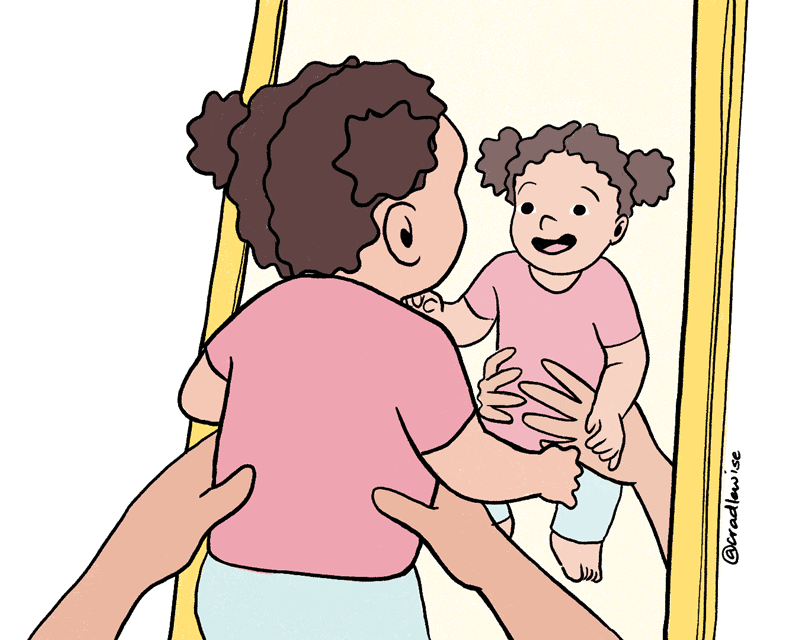
Many 7-month old babies will start to see some regulation in their sleep for a few different reasons:
- They are getting older and developing more, so their sleep-wake cycles are becoming more consistent.
- Many babies are starting solids, which can help them sleep through the night.
- They have recently completed a big growth spurt around 6 months.
However, while many of those factors can help sleep, for some babies, they can also disrupt zzzs. Just like adults, no baby responds in exactly the same way to changes in their lives.
7-month milestones
7-month milestones
The Centers for Disease Control and Prevention (CDC) does not have specific milestones for a 7-month-old baby. However, by 7 months, most babies should be reaching milestones the CDC sets for 6 month-old-babies such as:
- Recognizes familiar faces
- Laughs at things they find funny
- Imitates sounds and “talks” by squealing
- Reaches for things
- Brings items to their mouth
- Rolls from stomach to back
- Pushes themselves up on arms
- Leans on hands when sitting to prop themselves up
All of these major milestones can impact sleep in two different ways: They can either lead to your baby being more tired at night from all of their increased activity, or they can interrupt sleep patterns. Some babies may want to experiment with their newfound abilities and stay up longer. Others might be tempted to conk out earlier. The best thing you can do is stay the course: Stick to consistent bedtime routines, and make sure your baby doesn’t become overtired. With babies, sleep begets sleep and that doesn’t change just because they seem more physically active.
Again, it’s important to keep in mind that every baby is different and will develop on their own timeline. But if you have concerns about the 6-month milestones, check in with your baby’s pediatrician.
Activities for a 7-month-old
Activities for a 7-month-old
Life with 7-month-old babies can be a lot of fun, because they are young enough that they aren’t necessarily getting into everything (that stage is coming!), yet have enough motor skills to play and engage with the world around them.
Playing at this age is not only fun for you and your little one—it’s also how they learn and develop as well. Playing is your baby’s form of “work” and it’s incredibly beneficial for their brain. Follow your instincts when it comes to play, but if you need some ideas, here are some CDC-approved activities for 7-month-olds:
- Play music and sing.
- Practice talking back and forth—babies love to interact at this age.
- Read together daily and explore pictures in the books.
- Put favorite toys just out of reach of your baby when they’re having supervised tummy time to encourage motor skill development.
- Hide a toy behind your back, then surprise them by bringing it out again. It’s simple, but it’s setting the building blocks for cause and effect in their brains.
- Use a baby carrier to get outside—point to interesting things and explain them to your baby.
Toys for 7-month-olds
Toys for 7-month-olds
Parents of 7-month-old babies don’t need to load up on specific toys, but certain things can be fun and developmentally appropriate. Look for toys that can provide some stimulation, such as music, or ones that help promote the cause-and-effect brain development that’s occurring right now. Some suggestions for toys for 7-month-old babies include:
- Play gyms with toys that dangle so they can practice reaching
- Board books with unusual textures
- Musical toys that sing songs to them
- Child-safe mirrors so they can check out their favorite sight: Their own face
- Teething toys
What’s going on in your baby’s brain?
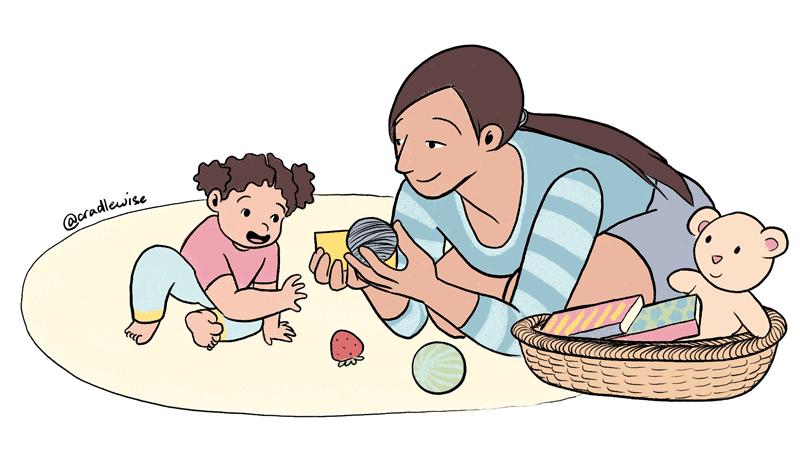
A lot of brain growth and development happens around 6 and 7 months for babies. They are starting to learn language, see in full color, and perform physical milestones like reaching for toys and sitting up. Your baby’s 7-month-old emotional development is also growing by leaps and bounds, as they learn about the concept of preferences—don’t be surprised if they start favoring certain people over others.
To encourage brain development in a 7-month-old baby, try to engage multiple senses simultaneously—read aloud, talk to them, or roll a ball back and forth. These small, simple activities will lead to big cognitive gains.
Research has shown that certain foods may be beneficial for 7-month-old brain development, and the American Academy of Pediatrics (AAP) recommends nutrients such as folate, vitamins A and D, protein, and several others. Be sure to start introducing plenty of healthy fats, such as smashed avocados, and protein, like small bites of yogurt, to support cognitive growth. (For more ideas, UCLA Health has a list of foods to help encourage brain development.)
How much should a 7-month-old sleep?
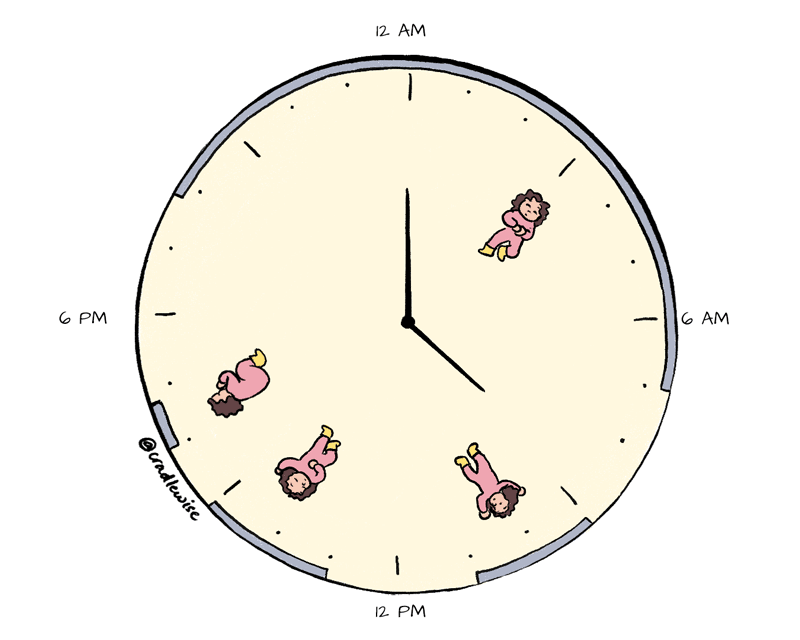
Wondering how much a 7-month-old baby should sleep? Here’s a quick look:
- Total hours of sleep: 12 to 16 hours of sleep in a 24-hour period; some babies will need 13 to 14.
- 7 month wake windows: Between 2 and 2.5 hours.
- Number of naps: 4 hours of naps, broken down into 2 to 3 naps throughout the day.
Sample sleep schedules
Every baby is different, but here is a sample sleep schedule for a 7-month-old baby:
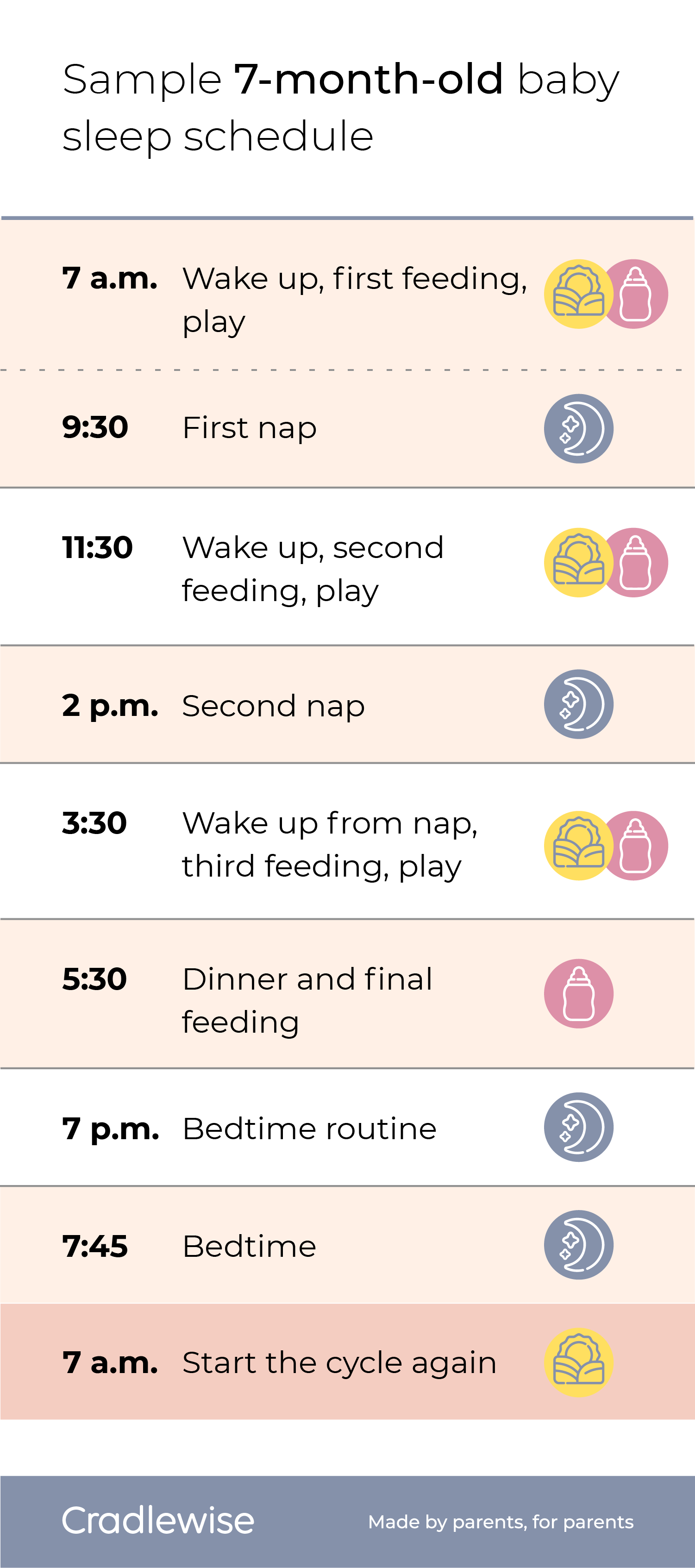

This 7 month old schedule allows for around 12 hours of sleep at night, so keep in mind that it could be customized to your baby’s sleep needs.
7-month-old feeding tips
At 7 months old, your baby will still primarily be eating breast milk or formula for the bulk of their nutrition, but they are also most likely eating solids now. Here are some quick stats on feeding a 7-month-old baby:
- How much should a 7-month-old eat: At seven months, your baby will drink breastmilk or formula 3 to 5 times a day for a total of 30 to 32 ounces per day. If you’re breastfeeding, continue to nurse on demand, because you can’t overfeed a breastfed baby.
- How much should a 7-month-old weigh: The average 7-month-old baby boy weighs 19 pounds and the average 7-month-old baby girl weighs 17.4 pounds, according to data from the World Health Organization. Be sure to keep your baby’s well-child checks with your doctor, so they monitor your baby’s growth.
- How often should a 7-month-old eat: Typically, a 7-month-old baby will want to eat every 3 to 4 hours. Along with a bottle or nursing, your baby can have around 1 to 2 tablespoons of food at mealtime and snack times. Don’t force food on your baby; this is a good time to help your baby learn their own cues for satiety and to stop feeding them when they show signs of being full, such as turning their head away or closing their lips.
How to help support your baby’s sleep during the seventh month
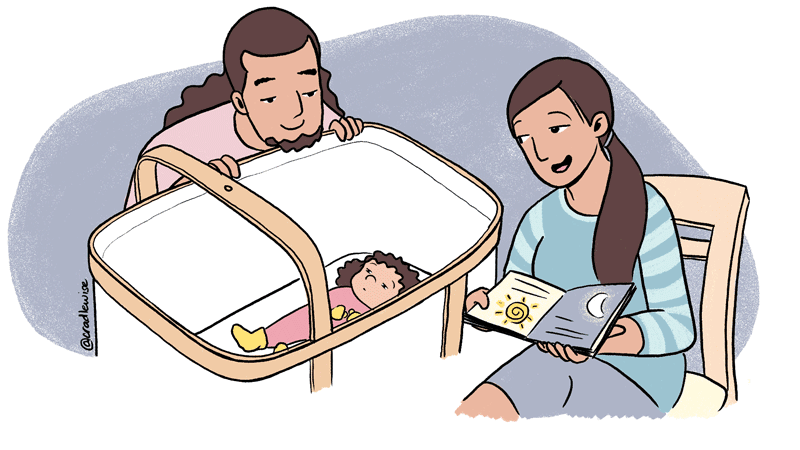
During your baby’s 7 months of life, it can be helpful to keep the following sleep tips in mind:
Don’t let your baby get overtired.
Don’t let your baby get overtired.
It’s tempting to let your baby stay up and play—they are more active now, so you might assume that your baby will sleep better if they stay up a little longer or tire themselves out. But overtired and overstimulated babies can actually resist sleep and it can throw off their whole sleep cycle. Instead, stick to their bedtimes and, if possible, don’t let your baby get off schedule.
Keep those daytime naps.
Keep those daytime naps.
Similarly, maintain a good nap schedule during the day to ensure your baby is getting all the sleep they need. Your baby actually needs more sleep, not less, the more active they are. And as you and your baby start to have a busier schedule it can be tempting to allow your baby to nap in the car or stroller, they’re still going to get the highest quality rest at home in their familiar crib.
Continue to keep your baby’s sleeping area clear.
Continue to keep your baby’s sleeping area clear.
Your baby might love their blankets and favorite stuffies during the day, but even if it seems like a cozy idea, the AAP still recommends keeping all bedding, stuffed animals, and pillows out of your baby’s sleeping area until they’re at least one.
Be consistent in your bedtime routine.
Be consistent in your bedtime routine.
The biggest piece of sleep advice for your baby at any age is to stick to a consistent sleep and bedtime routine, and it’s never too late to start one. Once those cues are in place, they will signal to your baby that it’s time for sleep. You might try things like a bath, the same story, a quick massage, a specific nightlight or turning on white noise or a familiar song.
FAQs
Q: Can a 7-month-old sleep through the night?
A: Many babies at this age sleep through the night, but some wake ocassionally. However, at 7-months-old, most babies have learned how to self-soothe and go back to sleep on their own.
Q: How often do 7-month-old babies nap?
A: 7-month-old babies need around 4 hours of nap time, split between 2 to 3 naps throughout the day.
Q: How much nighttime sleep for a 7-month-old baby?
A:9 to 12 hours.
Q: How long are 7-month-old wake windows?
A:Most 7-month-old babies are awake for 2 to 2.5 hours before needing a nap.
Q: Do 7-month-old babies experience sleep regressions?
A: Some babies do experience sleep regressions in month 7.
Sources:
- Six and seven-month-old baby milestones. 2020. Centers for Disease Control and Prevention. Important Milestones: Your Baby By Six Months.
- Recommended nutrients for brain health. 2022. UCLA Health. Baby brain food: 7 foods to fuel brain development.
- Feeding milestones. n.d. Stanford Health. Feeding Guide for the First Year.
- Growth charts. 2022. World Health Organization. WHO Growth Standards Are Recommended for Use in the U.S. for Infants and Children 0 to 2 Years of Age.
- How much to feed your baby. 2022. Centers for Disease Control and Prevention. How Much and How Often To Feed.
You may also like





